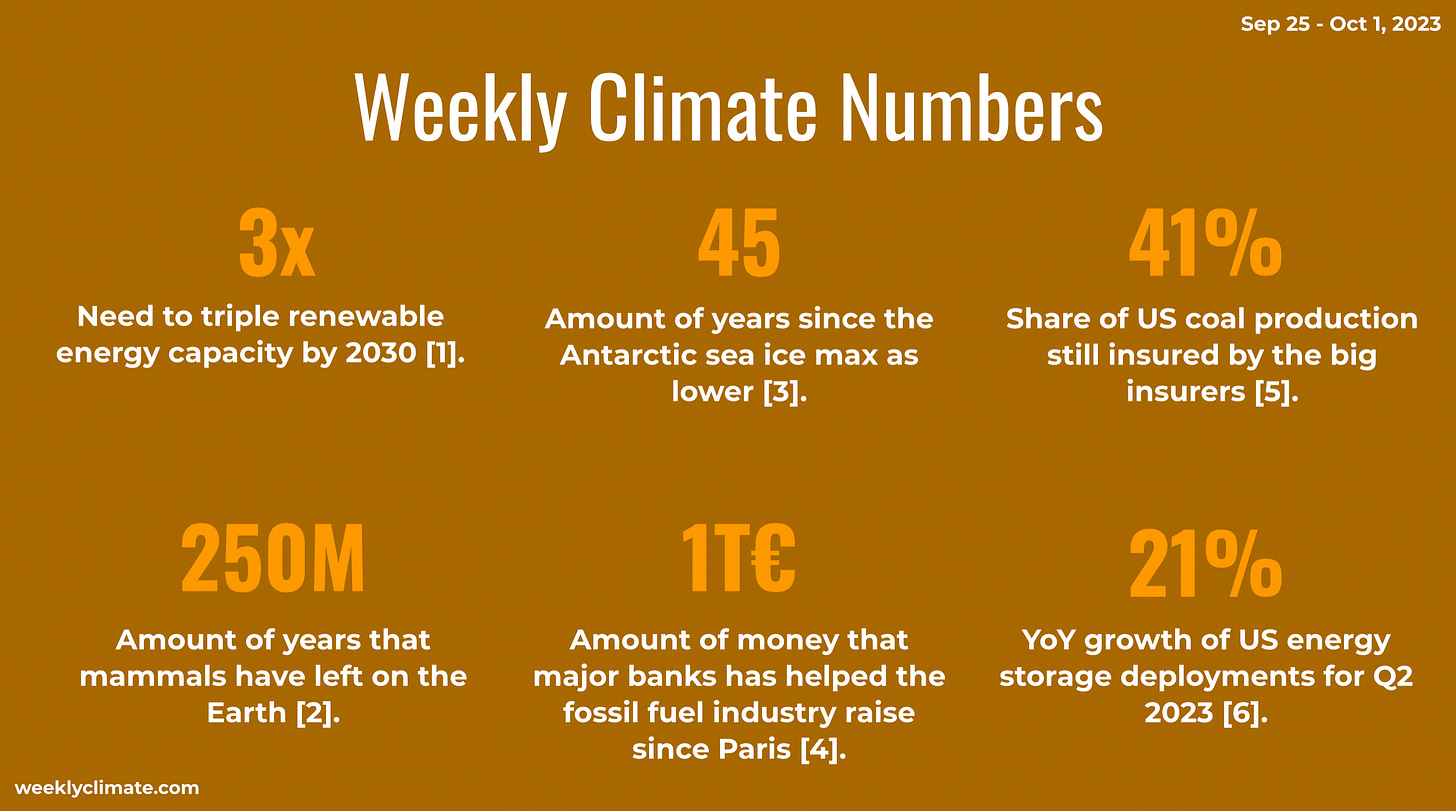[Sep 25-Oct 1'23] "No place to hide for fossil fuels"
EU banks helped fossil fuel firms raise 1T€, future-proof veggies and fruit, behaviour change, new IEA net-zero report.
Welcome to this week’s edition of The Weekly Climate 🎉
References: [1], [2], [3], [4], [5] and [6].
‼️News you can’t miss
Here’s one important scary/bad (🙀), good (😻), interesting (😼) and fossil (💩) news item.
🙀 EU banks helped fossil fuel industry raise 1T€
😻 Future proof veggies and fruits
😼 Do we need to change behaviour?
💩 New IEA net zero report leaves no place to hide for fossil fuels
👩⚕️ Status: Climate & Science
Let’s look at how we’re doing this week!
[IEAreport] — The International Energy Agency (IEA) has released a new net zero report that emphasizes the need for big polluters to transition away from fossil fuels and focus on cost-effective solutions like renewables, energy efficiency, and electrification. The report downgrades the role of carbon capture and hydrogen technologies, stating that they have not lived up to expectations. The IEA also calls on all countries to accelerate their net zero plans, with rich nations urged to reach net zero emissions by 2045. The report highlights the limited potential of hydrogen and the underperformance of carbon capture, while revising projections for solar power and electric vehicles upwards.
[#ecologicalovershoot] — A recent academic paper discusses the concept of "ecological overshoot" caused by capitalism and consumer culture, leading to the overconsumption of natural resources. The paper argues that focusing solely on technological climate solutions without addressing systemic behavioral changes will worsen ecological overshoot and increase the likelihood of societal breakdown. The authors call for global recognition of a "Human Behavioral Crisis" and the need for systemic change in social norms alongside changes in energy systems.
[#halfover] — Scientists predict that mammals, including humans, may only have another 250 million years left on Earth due to a combination of a brighter sun, changes in continent geography, and increases in carbon dioxide. The formation of a future supercontinent called Pangea Ultima will contribute to much hotter temperatures, potentially leading to a mass extinction of mammals. However, some areas on the fringes of Pangea Ultima may remain survivable. The research suggests that mammals may eventually be replaced by heat-tolerant reptiles.
[#antarctic] — New data reveals that global sea ice extent is at a record low due to rapid Antarctic sea ice melt and below-average Arctic coverage. Antarctic sea ice extent has been tracking at record-low levels for almost the entire year, reaching its annual maximum at the smallest extent in the 45-year satellite record. Arctic sea ice extent reached its minimum for the year, ranking as the sixth-lowest on record. The record-low sea ice levels in both poles have received widespread attention and have implications for wildlife and climate change.
📰 The 7 Grand Challenges
⚡️Decarbonize Electricity
Clean electricity is the one do-or-die challenge we must solve.
[#energystorage] — The United States saw record growth in energy storage in the second quarter, but the industry still faces challenges due to parts shortages and delays. While utility-scale storage projects increased, there was a decrease in home-based projects. The average duration of battery storage systems also increased. The growth in energy storage is crucial for the transition to clean energy, but there are factors tapping the brakes on its rapid expansion.
[#fusion] — Scientists at the National Ignition Facility in California have achieved a breakthrough in nuclear fusion by generating a burst of energy using lasers. The experiment produced 3.88 megajoules of energy, surpassing expectations and indicating that laser fusion can become more efficient. However, slight variations in the lasers and fuel capsules can affect the fusion reactions. Further experiments are planned to optimize the process and generate higher fusion yields.
[#trumpsworld] — Former US President Donald Trump falsely claims that wind turbines are causing whale deaths, making baseless statements during a campaign rally in South Carolina. Trump has a history of spreading misinformation about renewable energy, including previously claiming that wind turbines cause cancer and kill birds. Experts have debunked these claims, stating that there is no scientific evidence linking wind turbines to whale deaths. The US is now developing offshore wind farms, supported by President Joe Biden as a clean energy solution. Critics have raised concerns about the impact on whales, but scientists largely dismiss these claims, attributing whale deaths to boat collisions and fishing gear entanglement.
[#greengrowth] — The chief of the International Energy Agency (IEA) has stated that the significant growth of renewable energy and green investment in the past two years has brightened the prospects of staying within the 1.5C limit on global heating. While more needs to be done, the rapid uptake of solar power and electric vehicles is encouraging. The IEA also called on developed countries with 2050 net zero targets to bring them forward by several years. The upcoming UN climate summit, Cop28, is seen as a key opportunity for countries to set out tougher emissions-cutting plans.
🏘 Reduce impact of urban and rural areas
Lowering the impact of urban and rural areas.



